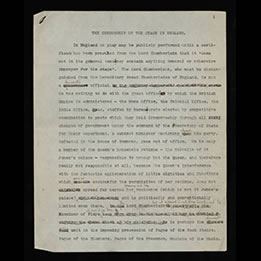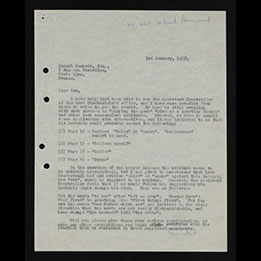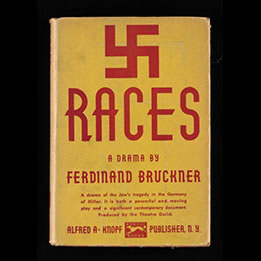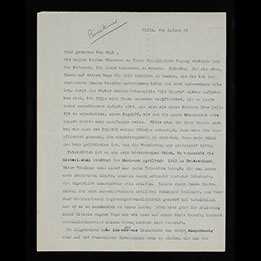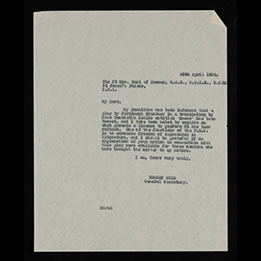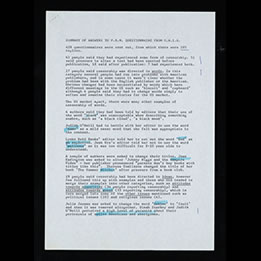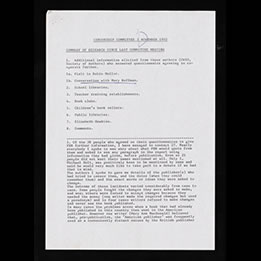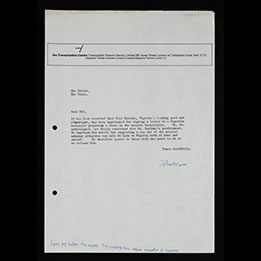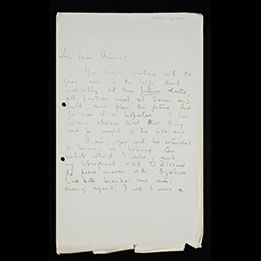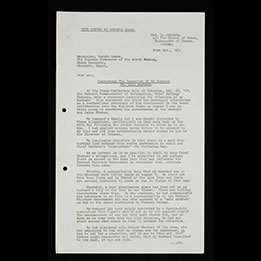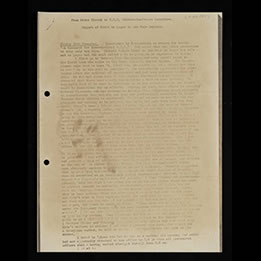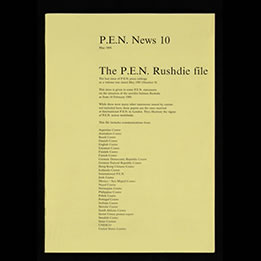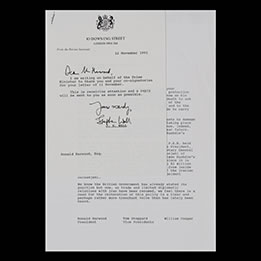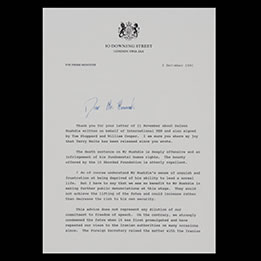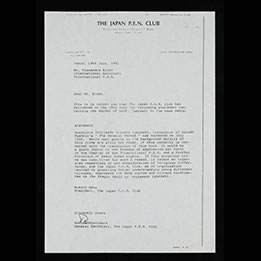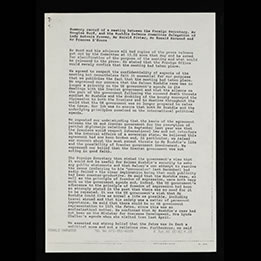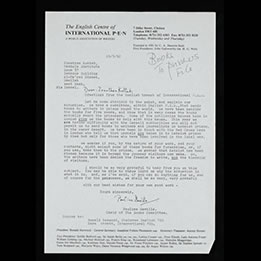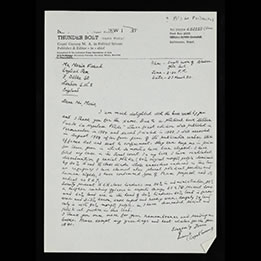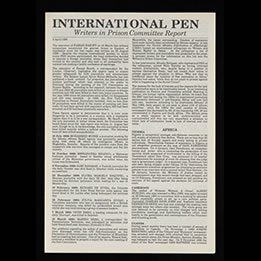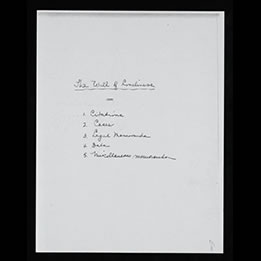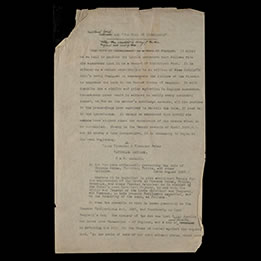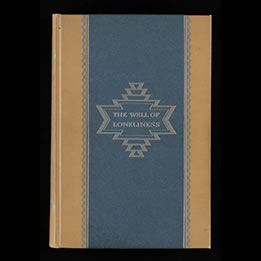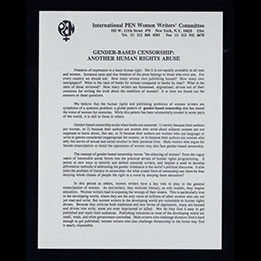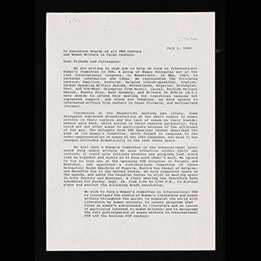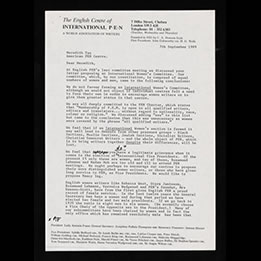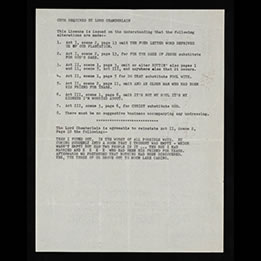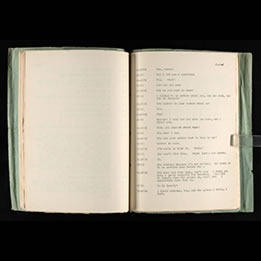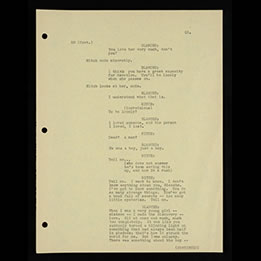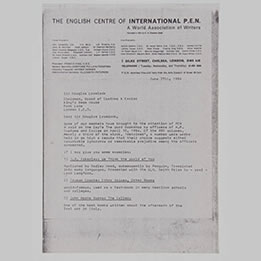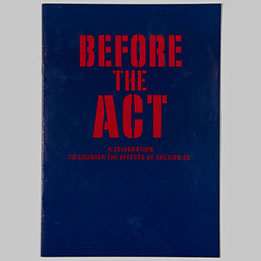International Human Rights
Writers and Free Speech
Writers in Exile / Global
Refugees
Writing the Cold War
Writing World War II
Digital Collections
Writers and Free Speech
The PEN Records and the Ransom Center's collections contain many materials that document the ongoing struggle
of writers against censorship from official, social, and economic sources. As PEN developed as an
organization, its leadership responded to the need to advocate for writers working in (or fleeing from)
totalitarian regimes, first in Nazi Germany and later in Soviet-bloc nations, the Middle East, Southeast Asia,
apartheid-era South Africa, and elsewhere. While the infamous fatwa issued against Salman Rushdie upon the
publication of The Satanic Verses in 1988 was a galvanizing moment for PEN Centres around the world,
the question of writers' freedom of expression was foundational to PEN's mission throughout the twentieth
century. The materials in this guide document particular moments of conflict and crisis in the developing
discussion of censorship at PEN over the last hundred years. They offer opportunities for students to explore
questions of free speech, human identity, and the often fraught relationship between politics and culture.
Origins: PEN, Fascism, and Free Speech
The 11th International PEN Congress in Dubrovnik was pivotal in PEN's history, marking one of the first
significant shifts in its identity from an informal gathering of writers to a reluctantly political
organization. The 1926 Congress in Berlin had seen President John Galsworthy establish the resolutions that
would become PEN's charter after German playwright Ernst Toller insisted that the organization could no longer
ignore politics in the face of rising nationalist movements. These resolutions were put to the test in 1933
when the members of German PEN were challenged by the English and American delegates for their failure to
protest the book burnings and censorship enacted by the National Socialist Party, and for the expulsion of
communist members from the German centre.
View Item
11th PEN International Congress, Dubrovnik, Yugoslavia, 1933. Minutes of a Session. May 26, 1933.
PEN Records 82.1
View Item
Report of the PEN Congress, by Henry Seidel Canby, American delegate; and speech by Ernst Toller
representing exiled writers. 1933.
PEN Records 82.1
View Item
Speech by H. G. Wells at opening of the 11th PEN International Congress, Dubrovnik, Yugoslavia. May
25, 1933.
PEN Records 82.1
Censorship on the British Stage
From 1737 to 1968, the Lord Chamberlain's Office was responsible for determining whether plays staged in
Britain were suitable for public performance. While the British theatre has a long history of confronting
censorship from both church and state, the Lord Chamberlain's exclusive power became a particular point of
conflict during the twentieth century, as modern dramatists increasingly tested the boundaries of social,
political, and artistic convention. These items offer a snapshot of this conflict in the work of several
prominent playwrights, and of an attempt by PEN to intervene in the censorship of an English production of
Ferdinand Bruckner's Races (Die Rassen): one of the first plays to directly criticize fascism and
anti-Semitism in Nazi Germany.
View Item
Typescript draft of "The Censorship of the Stage in England" by George Bernard
Shaw, ca. 1899. Published in The North American Review. August 1899.
George Bernard Shaw Collection 6.9
View Item
Correspondence between Samuel Beckett and George Devine regarding the
censorship of Beckett's Endgame by the Lord Chamberlain's Office. January 3, 1958–July
28, 1958.
Royal Court Theatre Company Collection 1.2
View Item
Races, a drama by Ferdinand Bruckner [pseud.] translated from the German for the first time by
Ruth Langner, (New York: Knopf). 1934.
PT 2642 A3 R32 1934 HRC-TA
View Item
Typescript letter from Ferdinand Bruckner to the PEN Club. June 24, 1934.
PEN Records 8.4
View Item
Correspondence between PEN and The Lord Chamberlain's Office regarding Ferdinand Bruckner's Races
(Die Rassen). April 25, 1934–May 8, 1934.
PEN Records 21.1
Censorship and Children's Publishing in the U.K.
In January 1992, the English PEN Centre published a report on censorship in children's literature based on a
survey of authors, illustrators, and publishers. This report stemmed from concerns about the effects of
"political correctness" on authors' and illustrators' freedom of expression. These items illuminate the market
effects of increasing calls for equal representation of race and gender in children's literature, and the
resulting conflicts these pressures raised between writers and publishers. Many authors felt the desire for
"political correctness" had gone too far, citing instances of being given ratios for the representation of
non-white characters, being told to remove references that might offend particular religious groups, or having
their work rejected when they refused to make changes. Others, however, expressed their support for equal
representation and recognized the need for action from the industry in the face of decades of imbalance. While
some of the views disparaging "political correctness" in these reports implicitly proceed from racist and
xenophobic assumptions, they nevertheless offer an opportunity for students to engage in ongoing debates
regarding freedom of speech, the interaction of market forces with social justice, and the role of literature
in representing a diverse society.
View Item
"Summary of Answers to P.E.N. Questionnaire from Children's Writers and Illustrators Guild." August
25, 1992.
PEN Records 234.1
View Item
PEN Censorship Committee Report: Summary of research since last committee meeting. November 3, 1992.
PEN Records 234.1
View Item
News clippings featuring responses to PEN Report on Censorship. 1992.
PEN Records 234.1
Wole Soyinka
Nigerian playwright, poet, and critic Akinwande Oluwole Babatunde Soyinka, known as Wole Soyinka, was the
first African writer to win the Nobel Prize in Literature (1986). During the 1967 Nigerian Civil War, Soyinka
was arrested and held for two years by the government of General Yakubu Gowon, officially accused of
conspiracy with the rebel forces of Odumegwu Ojukwu, for an article he had published asking for a cease-fire.
These items demonstrate both the very real threats facing writers whose work challenged authoritarian
governments, and the tactics used by PEN and other organizations to advocate on these writers' behalf.
View Item
Letter from the Transcription Centre to the Times editor advocating the
release of Wole Soyinka, and a list of prominent writers who signed the letter. Undated.
Transcription Centre Papers 18.1
View Item
Letter from Wole Soyinka to Aminu Abdulahi. August 17, 1967.
Transcription Centre Papers 18.1
View Item
Letter from Olaide Idowu Soyinka to Major General Yakubu Gowon. October 31, 1967.
Transcription Centre Papers 18.1
View Item
Report of Visit to Lagos to see Wole Soyinka from Peter Elstob to PEN Writers in Prison Committee.
November 10, 1967.
Transcription Centre Papers 18.1
Salman Rushdie
The publication of Salman Rushdie's novel The Satanic Verses (1988), which contained material some
considered blasphemous to the Islamic faith, led to a condemnation of the work by the religious leader of
Iran, Ayatollah Sayyid Ruhollah Mūsavi Khomeini, who issued a fatwa calling for Rushdie's death.
Rushdie was forced into hiding for several years. During this time, PEN International and many PEN Centres
across the globe advocated for the lifting of the fatwa, lobbying governments both in their home
countries and in Iran, raising funds, and condemning the issuing of a death sentence for a writer's work.
While the issue led to some division among the centres, with many members criticizing the book for
insensitivity, or debating PEN's role in the charged political situation, the Rushdie case generally united
PEN and its centres around a common goal of advocacy for free speech and against violence towards writers. The
debates surrounding Rushdie's case offer striking comparisons with recent controversies surrounding religion
and freedom of expression, including the Charlie Hebdo attacks and recent conflicts over hate speech on
university campuses.
View Item
PEN News 10: The PEN Rushdie file. May 1989.
PEN Records 262.7
View Item
Letter from English PEN to Prime Minister John Major. November 11, 1991.
PEN Records 324.1
View Item
Letter from Prime Minister John Major to English PEN. December 2, 1991.
PEN Records 324.1
View Item
Letter from Japan PEN Club to Alexandre Blokh describing the murder of Rushdie translator Hitoshi
Igarashi. July 19, 1991.
PEN Records 262.7
View Item
Summary record of a meeting between the Foreign Secretary and Rushdie Defence Committee delegation.
June 6, 1991.
PEN Records 262.7
Books for Prisoners/Writers in Prison
PEN has a history of advocating for incarcerated writers dating at least as far back as the mid-1930s, when
President H. G. Wells, E. M. Forster, and Aldous Huxley, along with many other members, lobbied for the
release of Federico García Lorca and Arthur Koestler during the Spanish Civil War. This commitment led to the
creation of the International Writers in Prison Committee in 1960, which would come to form a large part of
PEN's global outreach efforts. This committee investigated the case of writers imprisoned solely for their
opinions or writing. One of their earliest major campaigns, led by Arthur Miller, was for the release of Wole
Soyinka in 1967—an effort that ultimately succeeded. Beginning in 1986, the PEN Books for Prisoners Committee
was also created to solicit donations for books from publishers to provide to imprisoned writers across the
globe. This was a means for PEN not only to ease the suffering of incarcerated writers in a small way, but
also to make new contacts, to gather information about ongoing crises, and to put pressure on governments in
support of free speech. The items below illustrate PEN's work on behalf of incarcerated writers and offer
students a number of opportunities to reflect on the importance of watchdog organizations in uncovering and
condemning international human rights abuses.
View Item
Correspondence between PEN Books for Prisoners Committee and several Israeli
officials, including the Minister of Education, regarding books for Palestinian writers in Ketziot
Prison. May 23, 1992–August 26, 1992.
PEN Records 233.8
View Item
Letter from Nepalese writer Gopal Gurung to PEN Books for Prisoners Committee. March 27, 1990.
PEN Records 233.8
View Item
International PEN: Writers in Prison Committee Report. April 6, 1990.
PEN Records 242.5
The Well of Loneliness
English novelist Radclyffe Hall, who was present at the original PEN meetings hosted by feminist novelist
Catharine Amy Dawson Scott, was one of the first writers to have their work officially censored for containing
depictions of LGBTQIA+ characters and queer desire. The materials below relate to the censorship and legal
battles surrounding Hall's novel, which was successfully defended in the U.S. by attorney Morris Ernst.
Examining the case and materials surrounding the censorship of Hall's novel offers students an opportunity to
see how battles over freedom of expression, and over the definition of obscenity, are also often conflicts
over shifting boundaries of gender and sexuality.
View Item
The Well of Loneliness, 1926–1930: People of the State of New York v. Donald Friede
and Another, notes and draft legal papers. 1926–1929.
Morris Ernst Papers 234.2
View Item
Scotland Yard and The Well of Loneliness typescript, documenting the
suppression of The Well in England. April 1929.
Radclyffe Hall and Una Vincenzo, Lady Troubridge Papers 17.5
View Item
The Well of Loneliness by Radclyffe Hall, Victory Edition, (New York: Covici Friede). 1929.
PR 6015 A33 W43 1929
PEN International Women's Committee
These materials relate to the efforts of PEN America's Vice President Meredith Tax to form an International
Women's Committee for PEN, largely in response to the underrepresentation of women writers at the 1986 New
York Congress, where 90% of the delegates were male. Newly appointed president of PEN America, Norman Mailer,
had sparked headlines in the New York conference by stating that the gender imbalance existed because "there
were not enough women of sufficient intellectual caliber." Margaret Atwood, Betty Friedan, and many others
protested this response, stating their goal that the next congress, to be held in Toronto and Montreal in
1989, display a parity of representation between genders (which, thanks largely to these writers' efforts, it
did). These accounts of the initial resistance to the formation of an International Women's Committee
highlight the conflict in PEN's identity, even at the height of the Salman Rushdie crisis, regarding its
status as a political organization. Students might explore the intersectionality of Tax's call for
international support for and among women writers, or the gender dynamics of Mailer's statements and PEN's
initial reticence.
View Item
"Thinking locally, acting globally," clipping from The Women's Review of Books Vol. IX, No. 8.
May 1992.
PEN Records 242.3
View Item
"Gender-Based Censorship: Another Human Rights Abuse," newsletter. 1992.
PEN Records 242.3
View Item
Letter from Meredith Tax to PEN International regarding International Women's Committee. July 4,
1989.
PEN Records 223.1
View Item
Letter from Antonia Fraser and Josephine Pullein-Thompson to Meredith Tax
regarding American PEN's Proposal for an International Women's Committee. September 7, 1989.
PEN Records 223.1
Censoring Streetcar on Stage, Page, and Screen
Tennessee Williams's A Streetcar Named Desire (1947) is consistently listed among the most influential
works of twentieth-century American drama. It features controversial depictions of mental illness, sexuality,
and violence. As such, both the play and its subsequent film adaptation faced considerable censorship. This
series of items focuses on a particular scene, in which the character Blanche, played by Vivien Leigh in both
the London debut of the play and the later film, reveals that she had found her first husband in bed with
another man. Both the London play and the film edit this exchange to erase the implied sexual relationship
between the two men. Students approaching these materials will be able to observe the striking differences in
subsequent versions of Williams's work as a result of censorship from both the British government and
Hollywood, inviting discussion of the cultural norms and official standards that would find the depictions of
sexuality in the play unsuitable for public consumption.
View Item
Cuts required by the Lord Chamberlain to the London production of A Streetcar Named Desire.
1947.
Tennessee Williams Collection 43.9
View Item
Vivien Leigh's playscript of A Streetcar Named Desire, Act 2, Scene 2. 1949.
Tennessee Williams Collection 44.12
View Item
A Streetcar Named Desire, motion picture mimeo script. 1950.
Tennessee Williams Collection 44.6
PEN and Section 28: The U.K. Obscenity Act
In 1980s Britain, amidst the AIDS crisis and the rise of Margaret Thatcher's conservative government, gay and
lesbian rights became a major source of both political conflict and social activism. While sex between men had
been decriminalized in 1967 in the U.K., gay men and women, including many writers and artists, still
struggled against discrimination and censorship. This series highlights for students how equal rights and free
expression do not always follow from initial legislative actions, and offers opportunities to explore the
history of LGBTQIA+ rights in the contexts of censorship, literature, and the arts.
View Item
Letter from Francis King to Customs and Excise Board regarding seized books. June 27, 1984.
PEN Records 208.13
View Item
Letter from English PEN to the Times editor regarding Section 28. February 1, 1988.
PEN Records 208.13
View Item
Before the Act: A celebration to counter the effects of Section 28. June 5, 1988.
PEN Records 208.13
We have attempted to minimize harm or adverse impact by selecting primary sources
that we believe will not place people at risk. Please notify us at reference@hrc.utexas.edu if you believe we need to remove any
materials from this digital collection.
Takedown Notice: This material is made available for education and research
purposes. The Harry Ransom Center does not own the rights for these items; it cannot grant or deny permission
to use this material. Copyright law protects unpublished as well as published materials. Rights holders for
these materials may be listed in the WATCH
file. It is your responsibility to determine the rights status and secure whatever permission may be
needed for the use of any item. Due to the nature of archival collections, rights information may be
incomplete or out of date. We welcome updates or corrections. Upon request, we'll remove material from public
view while we address a rights issue.





